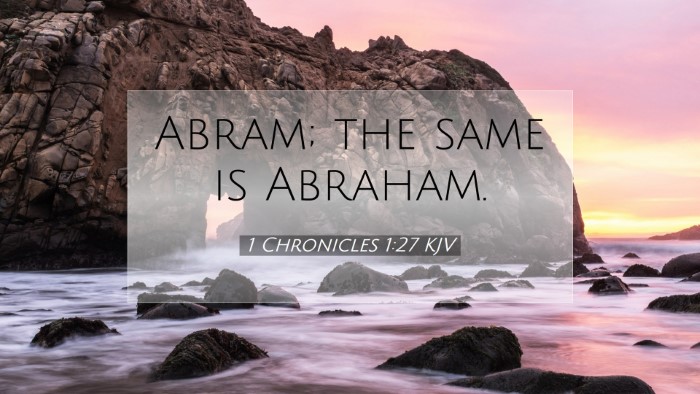Commentary on 1 Chronicles 1:27
1 Chronicles 1:27 states: "Abram; the same is Abraham." This verse is situated within the genealogical record that traces lineage from Adam to the patriarchs.
Contextual Background
The genealogies in Chronicles serve a crucial role in establishing the identity of Israel, emphasizing the faithfulness of God in preserving His covenant people. The mention of Abram/Abraham in this context highlights not only his historical prominence but also his spiritual significance as the father of many nations.
Insights from Public Domain Commentaries
Matthew Henry's Commentary
Matthew Henry emphasizes the importance of Abraham's role within the redemptive history. He notes that the name change from Abram to Abraham signifies a divine purpose that extends beyond Abraham himself, indicating a covenantal promise that God initiated. This name change is significant as it reflects one's calling and identity in the eyes of God.
Henry further reflects on the assurance that God gives to Abraham, marking him as a man of faith through which nations would be blessed. He notes, "As sure as God has called Abraham, so sure it is that he will fulfill his promises to those who are children of Abraham by faith."
Albert Barnes' Notes
Albert Barnes provides a detailed analysis of the significance of the names themselves. He explains the etymological meaning of 'Abram,' which means "exalted father," and 'Abraham,' which means "father of a multitude." This change signifies not only a personal transformation but also a missional identity charged with the responsibility to progeny that spans generations.
Barnes also points out the historical implications embedded in the name of Abraham, considering him not solely as a father to Isaac but as a foundational figure for all of Israel and, by extension, the Gentiles who would come to faith through Jesus Christ, the promised seed.
Adam Clarke's Commentary
Adam Clarke delves into the textual nuances, noting that the genealogical listing serves to confirm the lineage and blessedness of Abraham as critical to understanding Israel's history and promise. Clarke articulates that "the mention of Abraham here serves to connect the narrative of Genesis with the future hopes of Israel," reminding readers that God's covenant with Abraham is foundational for understanding the entirety of Scripture.
Clarke also emphasizes the importance of faith and obedience found in Abraham's life. He draws parallels between Abraham's immediate response to God's call and the requisite faithfulness expected from both the leaders and the people of Israel.
Theological Themes
- Covenant Theology: The transition from Abram to Abraham signifies God's commitment to establish a covenant that blesses not only his descendants but also the world.
- Identity and Faith: The change of names reflects a deeper identity rooted in faith. As Abraham becomes the father of nations, it emphasizes that identity in God often requires transformation and faithfulness.
- Historical Continuity: This genealogy reflects God's ongoing plan through history. Each name mentioned serves to reaffirm that God acts through history to fulfill His promises.
Application for Today
This verse, while concise, encapsulates profound theological implications for contemporary believers:
- Understanding Our Identity: Just as Abraham's name highlights his divine calling, Christians are called to understand their identity in Christ and their role in God's redemptive story.
- Faithfulness in Discipleship: Abraham's life demonstrates how faith requires action. Believers today are encouraged to respond to God's call with faith and obedience.
- The Power of God’s Promises: This verse serves as a reminder that God's promises are multi-generational. As believers, there is a legacy of faith that extends beyond ourselves.
Conclusion
1 Chronicles 1:27, though part of a genealogical record, conveys profound truths about identity, calling, and divine promise. As seen through the lenses of Henry, Barnes, and Clarke, there is a rich tapestry of meanings that highlights Abraham's role in salvation history. This encourages modern readers to reflect on their own faith journey and connection to God’s unfolding plan.


